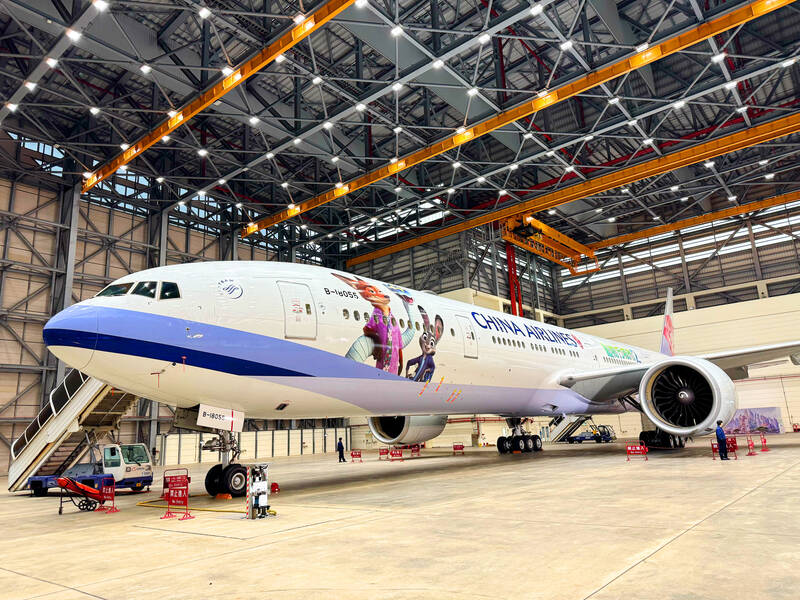China Airlines Ltd (CAL, 中華航空) yesterday unveiled the country’s first Disney-themed aircraft, featuring a special livery and onboard items with characters from the upcoming animated film Zootopia 2.
At the unveiling ceremony at Taiwan Taoyuan International Airport, CAL chairman Kao Shing-hwang (高星潢) said the plane would primarily serve the Taoyuan-Los Angeles route, but would also be deployed on flights to Bangkok, Tokyo, Osaka and Ontario, California.
The plane’s maiden flight with its new look was scheduled to depart Taoyuan for Los Angeles at 4:55pm yesterday, CAL said.

Photo: Tsai Yun-jung, Taipei Times
In addition to the exterior, items such as headrest covers and snack packaging also feature Zootopia 2 characters, it said.
CAL president Kevin Chen (陳漢銘) said the special livery would be in service for six months and that further collaborations with Disney are planned, as the carrier seeks to appeal to a younger air-travel market.
Earlier this month, CAL reported its cumulative revenue for the first three quarters of this year reached NT$154.98 billion (US$4.96 billion), an increase of 2.68 percent compared with the same period last year and setting a new record.
Over the same period, net profit was NT$11 billion, an increase of 6.1 percent year-on-year, and earnings per share came in at NT$1.81, also a record high for the period, the carrier said.
Zootopia 2 is scheduled to be released in Taiwan on Wednesday next week, according to Walt Disney Co.
For this quarter, CAL said the Christmas and New Year holidays are expected to boost travel demand and benefit its passenger business, while the fourth quarter is a peak season for cargo services and it is optimistic about continued growth in cargo revenue.

Sweeping policy changes under US Secretary of Health and Human Services Robert F. Kennedy Jr are having a chilling effect on vaccine makers as anti-vaccine rhetoric has turned into concrete changes in inoculation schedules and recommendations, investors and executives said. The administration of US President Donald Trump has in the past year upended vaccine recommendations, with the country last month ending its longstanding guidance that all children receive inoculations against flu, hepatitis A and other diseases. The unprecedented changes have led to diminished vaccine usage, hurt the investment case for some biotechs, and created a drag that would likely dent revenues and

Global semiconductor stocks advanced yesterday, as comments by Nvidia Corp chief executive officer Jensen Huang (黃仁勳) at Davos, Switzerland, helped reinforce investor enthusiasm for artificial intelligence (AI). Samsung Electronics Co gained as much as 5 percent to an all-time high, helping drive South Korea’s benchmark KOSPI above 5,000 for the first time. That came after the Philadelphia Semiconductor Index rose more than 3 percent to a fresh record on Wednesday, with a boost from Nvidia. The gains came amid broad risk-on trade after US President Donald Trump withdrew his threat of tariffs on some European nations over backing for Greenland. Huang further

CULPRITS: Factors that affected the slip included falling global crude oil prices, wait-and-see consumer attitudes due to US tariffs and a different Lunar New Year holiday schedule Taiwan’s retail sales ended a nine-year growth streak last year, slipping 0.2 percent from a year earlier as uncertainty over US tariff policies affected demand for durable goods, data released on Friday by the Ministry of Economic Affairs showed. Last year’s retail sales totaled NT$4.84 trillion (US$153.27 billion), down about NT$9.5 billion, or 0.2 percent, from 2024. Despite the decline, the figure was still the second-highest annual sales total on record. Ministry statistics department deputy head Chen Yu-fang (陳玉芳) said sales of cars, motorcycles and related products, which accounted for 17.4 percent of total retail rales last year, fell NT$68.1 billion, or

HSBC Bank Taiwan Ltd (匯豐台灣商銀) and the Taiwan High Prosecutors Office recently signed a memorandum of understanding (MOU) to enhance cooperation on the suspicious transaction analysis mechanism. This landmark agreement makes HSBC the first foreign bank in Taiwan to establish such a partnership with the High Prosecutors Office, underscoring its commitment to active anti-fraud initiatives, financial inclusion, and the “Treating Customers Fairly” principle. Through this deep public-private collaboration, both parties aim to co-create a secure financial ecosystem via early warning detection and precise fraud prevention technologies. At the signing ceremony, HSBC Taiwan CEO and head of banking Adam Chen (陳志堅)